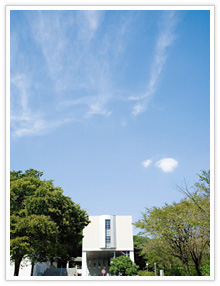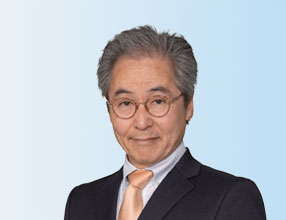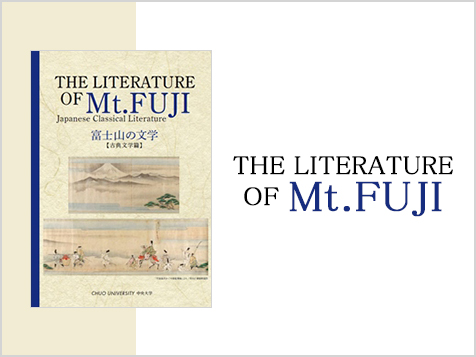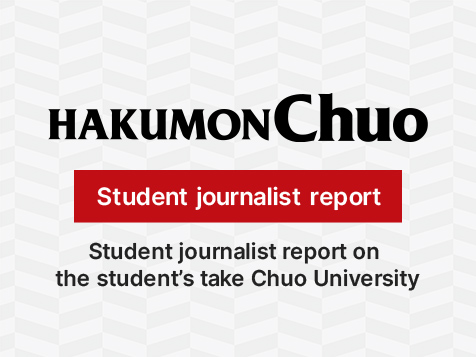Academics
Faculty of Policy Studies

The Faculty of Policy Studies was founded in 1993 as a multidisciplinary liberal arts faculty for the purpose of developing the art of resolving complex problems facing humanity by integrating diverse knowledge across sciences and humanities. Placing emphasis on issue-oriented approaches to problem solving, the Faculty offers a rich curriculum in two fields: (1) Policy Sciences and (2) Cross-Cultural Studies. The Faculty aims to equip students with tools, skills, and integrative knowledge that are necessary to succeed in this globalized world, and strives to turn out graduates who can meet new challenges of the twenty first century with commitment, self-confidence, and respect for diversity.
Respecting cultural values and heritage, the curriculum provides students with rigorous courses designed to develop their analytical capability as well as cross-cultural competence. Students are required to take case-study courses in which they learn how to analyze real world problems by combining theory, research methods, and data. With strengths in legal studies, social sciences, business management and administration, cross-cultural and regional studies, media, information technology, and languages, the Faculty of Policy Studies gives students the opportunity to pursue their particular field of interest with interdisciplinary approaches that help them analyze real cases and issues from multiple perspectives. Students learn the key theories in their research area through a series of lectures and seminar programs, while gaining experience through fieldwork, internships, and study abroad programs. The Faculty runs active overseas internship programs for students to get first-hand experiences in the real world. It also runs special lectures and seminars by distinguished practitioners from many professions and industries.
Students in the Faculty of Policy Studies have access to a wide range of foreign language classes taught by the staff of diverse cultural backgrounds. All students undertake three years of intensive English study, along with studying a second foreign language. Students can also major in any of the following foreign languages, while also pursuing courses in culture and history that are related to the language of their choice: German, French, Chinese, Korean, Arabic, Malay/Indonesian, Russian, Persian and Hindi/Urdu.The aim is to produce graduates with the combination of language skills and cultural insight that enables them to work at an international level in business, governmental, or nongovernmental organizations.
Areas of Concentration:
Policy Sciences
Cross-Cultural Studies
Date of Founding: 1993
Campus: Tama Campus
Number of Students: Undergraduate Student Enrollment
Challengers' Program as a New Commitment:
The globalization of the world and the complexity of the problems facing humanity calls for a new multidisciplinary education that cultivates communicative skills and international collaboration. To meet this call, the Faculty has started Challengers' Program from April 2010, which is a multi-disciplinary English-mediated program supported by active international collaboration in teaching and research. The program aims at turning out English proficient and professionally-minded individuals who will be willing to serve humanity with the spirit of caring and cooperation. The program is open to all students, domestic or foreign. The Faculty hopes that students, trained in this program, will be able to make significant contributions to the well being of mankind by initiating collaborative efforts at resolving humanity's problems with their multidisciplinary knowledge and communicative skills.
Department of Policy Sciences
This department offers two fields of concentration: (A) Professional Studies and (B) Management and Policy Sciences.
(A) Professional Studies
In Professional Studies, students focus on legal studies on the role of law in our society and economy as well as in world community. Drawing on Chuo University's prestigious reputation in the discipline of law, the Faculty of Policy Studies promotes interdisciplinary approaches to problem solving, borrowing ideas from social sciences, business management and administration, anthropology, and other disciplines to broaden and deepen students' insight into the function of the law in the contemporary world. Professional Studies follows four main strands: Law and Economics, Modern Contract Law, Policy Making, and Diplomacy.
(B) Management and Policy Sciences
Policy sciences aim at making the world and the society in which we live a better place by understanding problems and developing the methods and the art of solving them. Because the world is a complex order, policy sciences need to integrate diverse knowledge to cope with this complexity. For this reason, the policy sciences that this Faculty advances draws on Integrative Practical Knowledge that combines (1) mathematics and computer science, (2) social sciences, and (3) humanities. The idea is to apply this integrative knowledge in solving complex problems facing humanity, and to propose policies that are based on good understanding of human values as well as on scientifically sound reasoning. This is the guiding principle that runs through policy studies of the Faculty.
In Management and Policy Sciences, students focus on complex problems facing communities, governments, business firms, and humanity in general. They study how national and local governments are managed and administered, how business firms are managed to survive in this fast changing world, and how the problems facing humanity on a global scale have emerged. As to public management, students learn how the public sector manages food security, social security, national security (including environmental protection), natural disasters, urban planning, and population control, education, and scientific research, as well as how the public budgets are allocated to achieve the socially desired ends. As for business management, students learn how to manage business firms by developing an innovative mind and acquiring the required skills. Management in the globalized world, public or private, is made more effective when combined with cross-cultural awareness of the interconnections between organizational decisions and the culture in which such decisions take place. The global issues facing humanity are another important group of problems that are discussed and analyzed in many courses and seminars, both scientifically and in reference to human values. Integrative Practical Knowledge is particularly useful in addressing such issues as the power of multidisciplinary thinking comes to full force in apprehending them. Equipped with such knowledge and power, students can learn how to examine the efficacy of policy proposals through hypothesis testing and the art of model building and simulation.
Department of Cross-Cultural Studies
This department offers cross-cultural and regional studies. Culture is a major force in the globalized world, defining a field in which political, economic, and social changes take place, and providing spawning grounds in which human values are created. For this reason, this Faculty places equal emphasis on policy sciences and cross-cultural studies. Because all human activities take place within a cultural context, policy-related decisions are better made if cultural understanding is combined with scientific thinking. Cross-cultural studies are becoming increasingly important as the globalization of the world brings with it new projects on a grand scale for building partnerships or communities that stretch over many regions and cultures. With this awareness, students acquire knowledge in cross-cultural and regional studies as well as in a broad spectrum of topics from anthropology, and learn the richness and the diversity of human cultures. Because Asia is the main focus of the Faculty's engagement in cross-cultural studies, Asian studies is a particular strength of this faculty, with experts in Japan-China relations, Western Asia, South East Asia, and Russia. Students can learn the history and the culture of many regions of Asia as well as the impact of Westernization and globalization on Asian nations from historical and cultural perspectives. Students can also pursue their studies on the rapid changes that are taking place today in Asian countries in the midst of globalization. With this knowledge of Asian cultures, students can also reexamine Japanese culture and history from the perspectives that help redefine Japan's new role in the region. Acquiring cross-cultural knowledge and competence, students become ready for jobs in business, governmental, or non-governmental organizations, both in Japan and overseas.

The Faculty of Policy Studies was established in 1993 as the sixth Faculty of Chuo University. It was the second Policy Studies Faculty established in Japan, with other universities opening similar faculties since then. However, the most distinctive feature of the Faculty of Policy Studies at Chuo University is that the Faculty has upheld a philosophy of fusing policy and culture since its inception.
When the Faculty was established, society was facing a series of dramatic changes, such as the end of the Cold War, new international conflicts, and the end of a 55-year Japanese government regime. The same can be said now regarding increasing uncertainty in society, both domestic and international, with unpredictable changes becoming the norm.
In such social conditions, multifaceted study of both policy and culture in the Faculty of Policy Studies is essential. We cannot ignore the ingrained culture and values of society when reshaping society to be future-oriented. To bring the utility of our whole society toward reform, we should not fail to consider the perspectives of today’s citizens and residents. We need to ensure that no individuals or groups are denied dignity or omitted from the structure of the whole society.
To realize these goals, the Faculty of Policy Studies consists of two Departments. The Department of Policy Sciences offers systematic studies in law, politics, public administration, and economics and business administration, while the Department of Cross-Cultural Studies begins with basic courses in ethnicity, religion, and the arts, then advances to study of civilization and sociocultural theory. Both Departments simultaneously deepen multifaceted thinking through studying civil-society theory and culture-related policy theory.
Global learning is one of the pillars of reform at Chuo University's Tama Campus, and the opening of the Faculty of Global Management in 2019 was an important step in this direction. Since its establishment, the Faculty of Policy Studies has placed emphasis on English language education, while developing global studies that combine global perspectives with diverse and unbiased local perspectives, such as socio-cultural theory across nine regions and nine languages other than English, as well as courses in comparative culture and cultural exchange.
As part of the 30th anniversary of the Faculty of Policy Studies, a series of alumni lectures is being organized. Graduates in various fields take the stage and share how their multifaceted perspectives cultivated at the Faculty have been the foundation for their respective careers and activities.
30 years have passed since the establishment of the Faculty, and we are grateful to our alumni for reminding us of the significance of what the Faculty has put into practice. Going forward, the Faculty of Policy Studies will continue to grow as an unparalleled institution in Japan.
Kazumichi TSUTSUMI Dean, Faculty of Policy Studies









